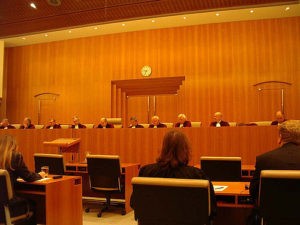By Eric King-
The UK’s snoop charter is illegal, according to a ruling by the EU’s highest court-the ECJ.
According to the ruling, general and indiscriminate retention of emails and electronic communications by governments is illegal. Only targeted interception of traffic and location data in order to combat serious crime is justified, according to the European Court of justice.
The judgement is a blow to the UK’s new Investigatory Powers Act – the so-called snooper’s charter. Until the UK’s actually leaves the EU, the UK’s snoop charter will not be able to take effect. Even when the UK leaves, a return to the illegal charter will be difficult because of an earlier High Court ruling that also ruled against it.
The ruling came in response to a legal challenge initially brought by the Brexit secretary, David Davis when he was a backbench MP, and Tom Watson, Labour’s deputy leader, over the legality of GCHQ’s bulk interception of call records and online messages.
The case was brought by David Davis before he became a minister under Theresa May’s governemnt. He argued that the government was treating the whole nation as suspects.
Davis and Watson, who were supported by Liberty, the Law Society, the Open Rights Group and Privacy International, had already won a high court battle on the issue but the government appealed and the case was referred to the ECJ.
The ECJ’s ruling is clear and condemns the fact that ”precise conclusions can be drawn from the private lives of persons whose data has been retained”. Detailed extracts from the ruling read:
“The interference by national legislation that provides for the retention of traffic data and location data with that right must therefore be considered to be particularly serious. The fact that the data is retained without the users of electronic communications services being informed of the fact is likely to cause the persons concerned to feel that their private lives are the subject of constant surveillance. Consequently, only the objective of fighting serious crime is capable of justifying such interference.
“Legislation prescribing a general and indiscriminate retention of data does not require there to be any relationship between the data which must be retained and a threat to public security and is not restricted to, inter alia, providing for retention of data pertaining to a particular time period and/or geographical area and/or a group of persons likely to be involved in a serious crime.
“Such national legislation therefore exceeds the limits of what is strictly necessary and cannot be considered to be justified within a democratic society, as required by the directive, read in the light of the charter.”
The Dripa case was heard by 15 ECJ judges at Luxembourg. Judges took into account the terrorist attacks in Paris, Brussels and Nice which initially sparked the political demands for the expansion of powers to intercept emails and phone calls to combat terrorism. The judgement from the European Court is a strong indication that the governments drive to battle terrorism does not justify the snoop charter




